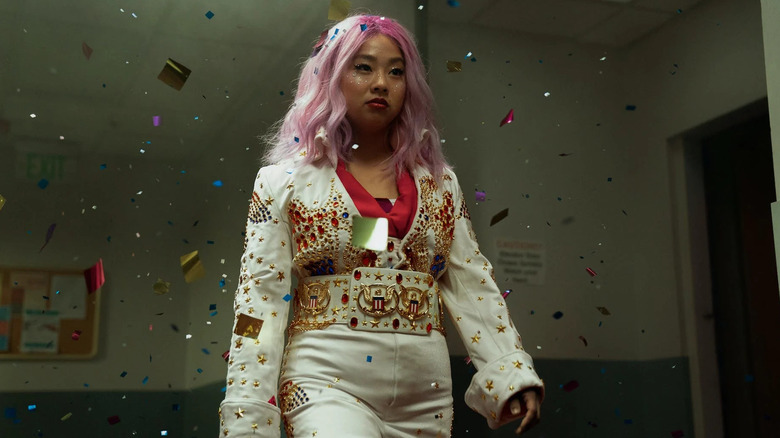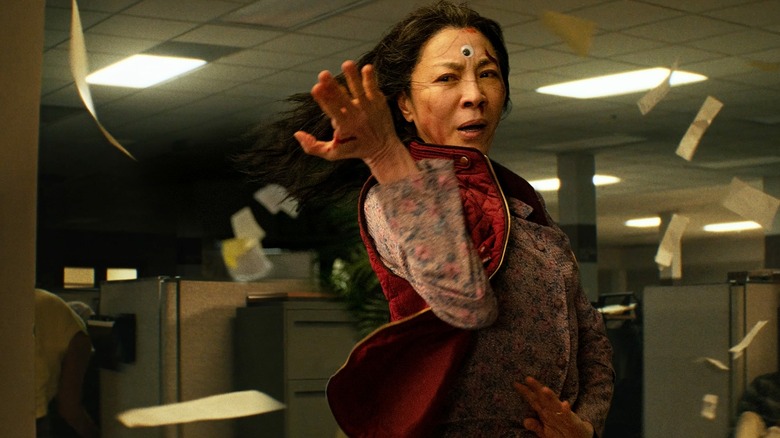Everything Everywhere All At Once Spoiler Review: A Manifesto For A New Generation
Warning: This review will discuss the writings of dead European philosophers like Albert Camus and Friedrich Nietzsche and Voltaire and Søren Kierkegaard, but the author assures you that these comparisons are apt
Would it be inappropriate to refer to Directed by Dan Kwan's and Daniel Scheinert's "Everything Everywhere All at Once" as a manifesto for a new generation? "Everything"'s ambitions are nothing short of confronting a decade of stale, withered hope and suggesting — while rocketing like a hamster, shot from a leaf-blower, straight through an exploding Wham-O Toys factory, and directly into the brain — that the only possible option is radical empathy. That the film succeeded as entertainment is astonishing enough. That it succeeded as an emotional masterpiece is downright miraculous.
"Everything Everywhere" manages to be insightful and playful, ridiculous and sublime, well, All at Once. There is no rule that says philosophy has to be heady, turgid, and academic. Indeed, a lot of philosophy can be told with a strong note of whimsy, energy, and passion, tongue firmly in cheek; there is room for sarcasm, winking, and giggling while reading Nietzsche. As Robert Solomon once said in Richard Linklater's "Waking Life," existentialism is not necessarily a philosophy of despair. It frees one to pursue dreams, love openly, and live passionately. Now imagine those notions as being the core of a live-action anime adaptation — and you've been alternating pages of "Either/Or" and MAD Magazine in between Pixy Stix — and your mind may be hovering somewhere around where "Everything Everywhere All at Once" lives.
The everything bagel of reality
"Everything" is about a put-upon laundromat owner named Evelyn Wang (Michelle Yeoh) whose business is being audited by a cruel tax assessor (Jamie Lee Curtis), whose daughter (Stephanie Hsu) is feeling increasingly alienated, especially since her queerness is something Evelyn is having trouble accepting, and whose husband Waymond (Ke Huy Quan) is on the cusp of leaving her. Overseeing Evelyn's stress is her father (James Hong), who casts a stern eye on her every action. While arguing for a tax break, Waymond blinks his eyes and has suddenly taken on a new persona. He reveals that he is a body-jumping agent from the Alpha-verse, and the people from his dimension have invented a way to "verse jump," that is: shunt their consciousnesses into the bodies of parallel universe counterparts. He and other verse jumpers are attempting to undo the work of a mysterious interdimensional absurdist named Jobu Tupaki who, thanks to the power of a gigantic black everything bagel, has unlocked the door to oblivion.
Evelyn must quickly learn the rules of verse jumping, absorb the knowledge and talent from her interdimensional duplicates (she is a chef in one universe, a martial artist in another, and someone very much like movie star Michelle Yeoh in a third), and confront the shape-shifting pseudo-deity who occupies the body of Joy. "Everything" has a great deal of fun altering Yeoh's agility and resources as she learns to absorb more and more talents. A highlight is when she learns to spin an outsize carwash arrow (as seen on street corners) to deadly effect. Another is when she realizes that in one universe, human beings have evolved to have hot dogs for fingers. The hot dog finger universe will also serve to open Evelyn's mind to more touching notions of queer romance, as Evelyn will find herself married to the Curtis character.
The film's violence is offset by its silliness; in order to shunt one's mind into another universe, they must do something that is statistically unlikely — echoes of Douglas Adams in that — which begin with innocuous things like switching your shoes between feet, to using an auditor's award trophy as a butt plug. This will lead to a wonderfully naughty scene wherein Yeoh must remove two assailants' butt plugs simultaneously in the middle of a "Matrix"-like bullet-time fight scene.
The precipice
There are two competing schools of thought at work in "Everything." On the one hand, there is the tantalizing temptation toward meaninglessness. Jobu Tupaki has filled her mind with the vastness of the cosmos and learned everything there is to learn. In linking her brain to every single version of herself from infinite parallel universes, she has essentially become a god, has become everything. Jobu Tupaki's nihilism is symbolized by a large, black everything bagel that she keeps on a pedestal in an eerie liturgical space. Everything, the bagel symbolizes, means nothing. Jobu doesn't quite quote Albert Camus, but her actions and dialogue are evocative of the famous passage from "The Stranger":
It was as if that great rush of anger had washed me clean, emptied me of hope, and, gazing up at the dark sky spangled with its signs and stars, for the first time, the first, I laid my heart open to the benign indifference of the universe.
And, yes, nihilism is tempting, isn't it? Especially after the last half-decade — of rising fascism, of eroding human rights, of horrendous disease — has left a residue of hopelessness in the collective unconsciousness. It's easier to accept apparent entropy when one accepts that nothing has meaning. Absurdity is a truth tool, and nihilism a weapon. Sit down on the precipice of chaos and simply stay there.
Countering Jobu Tupaki's bizarro bagel is Evelyn's Kierkegaard sense of hope. Evelyn has a taste of the chaos, and a look into the freedom of oblivion; she and Jobu have a few amazing scenes wherein they jump into the bodies of rocks and converse the comforts of nonexistence (handily subtitled). While Kierkegaard specifically discussed Christian faith in his writings, "Everything Everywhere" borrows his notion of edging up to the precipice, and taking the leap of faith. Evelyn is not willing to dive into the hole in the everything bagel, but she is happy to plummet off the precipice in the hope that she'll land in the arms of love. Family love, love of one's self. Comfort in the miniature pieces of meaning one gets from life's smaller, warmer moments.
The moments of warmth
This radical empathy — this acceptance that life does indeed have meaning, even if it is modest and fleeting — is at the core of the Daniels' manifesto. Deliberately, intellectually countering the addictive despair one feels from 30 minutes of doomscrolling on Twitter, "Everything" argues that our universe can be an ideal universe if we remain hopeful. And while this thesis does contain in it an element of Voltaire's distantly bitter optimism, it's certainly preferable to the ever-looming hole in the middle of the everything bagel.
Although "Everything" has a breakneck pace, sometimes feeling like a polka record stuck on 45, the fleeting moments of warmth are natural and heartfelt. A lot of the film's humanity comes from Quan's performance as Waymond, an aw-shucks, sad-sack everyman with a rich emotional life. Quan has had a long and impressive career that includes childhood roles in blockbusters (he played Short Round in "Indiana Jones and the Temple of Doom" as well as Data in "The Goonies") as well as stunt choreography on "X-Men" and "The One," and as assistant director for Wong Kar Wai on "2046." The latter of these likely influenced several scenes in "Everything" wherein Yeoh and Quan are pained lovers in an alleyway.
"Everything Everywhere All at Once" is an exploding human heart gleefully giving a wet willy to cynicism. It's as touching as it is wild. It feels like multiple films occurring simultaneously, which I intend to be a compliment. It's a film that unlocks multiple inner chambers the more one ponders it, each chamber revealing increasing facets of empathic humanity.
Good golly, what a thing.



